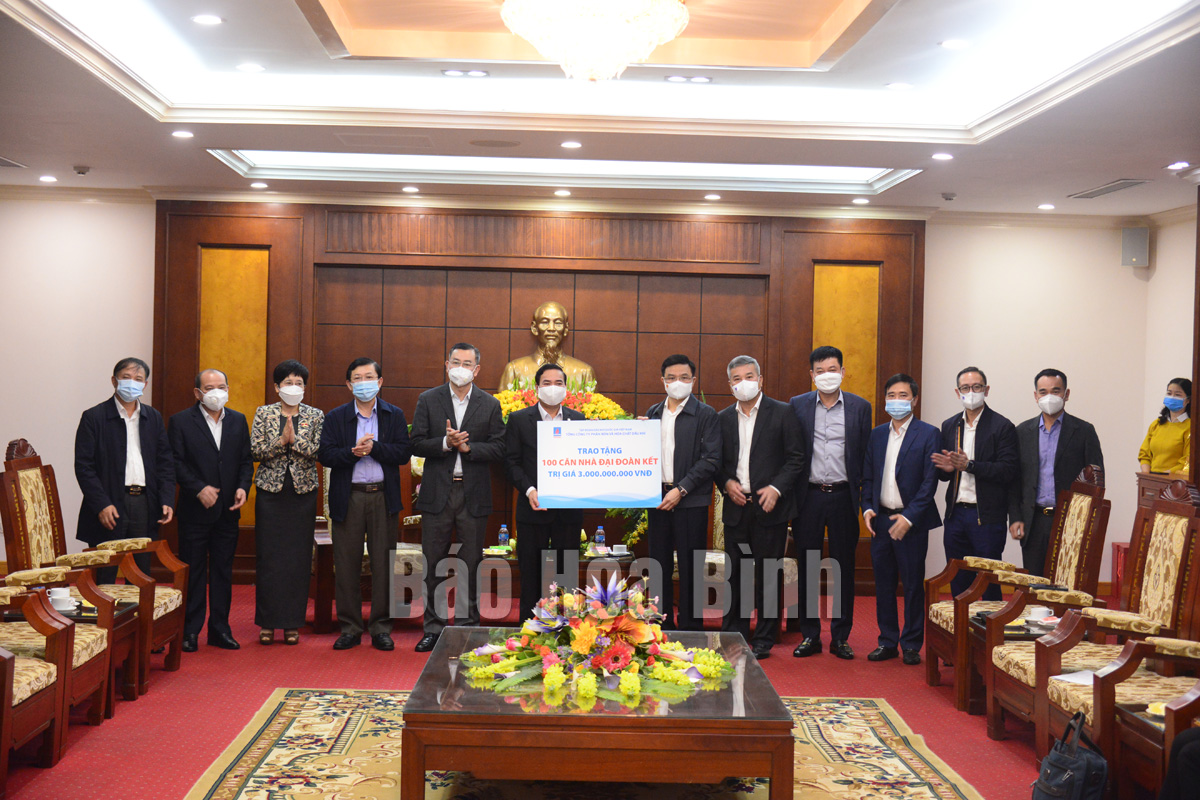
(HBO) – A delegation from the Vietnam Oil and Gas Group (PetroVietnam), headed by General Director Le Manh Hung, on November 17 visited Hoa Binh province to hand over its gifts of ambulances and charity houses.
PetroVietnam's
executive presents 100 charity houses built with the group’s funding to leaders
of Hoa Binh
At the working session, General Director Hung informed
Hoa Binh about PetroVietnam’s operations and social welfare activities over the
past time. He stressed the group's efforts to overcome challenges brought about
by the COVID-19 pandemic, coupled with dropping oil prices over the past nearly
two years.
As of October, PetroVietnam’s crude oil and gas
outputs hit 9.09 million tonnes and 6.28 billion m3, respectively. The group
also produced 1.42 million of petroleum products and 12.68 billion kWh of
electricity. The group reeled in 499 trillion VND in total revenue and
contributed 75.44 trillion VND to the State budget.
In addition, the group has paid special
attention to social welfare. Annually, it spends about 300-350 billion VND on
charity activities, support for the poor, the construction of medical and
educational facilities, and aid for victims of natural disasters and diseases.
In the 2016-2021 period, it hasso far donated about 18 billion VND to
social security activities in Hoa Binh alone.
According to the general director, this time, his
group presented two ambulances and 100 charity houses, which together are worth
more than 5 billion VND, in aid of people in disadvantaged circumstances in the
northern province.
Ngo Van Tuan, member of the Party Central
Committee and Secretary of the Hoa Binh Party Committee, congratulated
PetroVietnam on its business and production achievements and expressed his
gratitude for the kindness of the group and its executives and workers.
He hoped the group will further promote its
leading role in Vietnam’s economic development and contribute practically to
social welfare in the country in general and in Hoa Binh in particular, hence
raising the people’s living conditions./.
The Standing Board of the Hoa Binh provincial Party Committee has agreed in principle on a proposal by the Standing Board of the Party Committee of Hoa Binh city to gather feedback on the city’s 1:2000 zoning plan, which forms part of its broader urban development strategy.
Hoa Binh province has made notable progress in public administration reform and digital government development, with the satisfaction index among citizens and businesses reaching over 84%, according to recent government evaluations.
Thanks to great efforts by local authorities in recent times, the governance and public administration performance of Mai Chau district has been significantly improved.
In the afternoon of June 6, the Party Committee, the People's Council, the People's Committee and the Fatherland Front of Lac Son district solemnly held a meeting to celebrate the 139th anniversary of the district's founding (1886–2025) and the 79th anniversary of the establishment of the district's Party Committee (1946–2025). There was the attendance of Mr. Bui Van Thang, the Vice Chairman of the Provincial People's Council; Mr. Quach Tat Liem, the Vice Chairman of the Provincial People's Committee; Ms. Dang Bich Ngoc, the Deputy Head of the National Assembly Delegation of the province; as well as the former leaders of the province and district through various periods, who are the natives of the district.
Implementing the Politburo’s Resolution No. 57-NQ/TW on breakthroughs in science – technology, innovation, and digital transformation is a golden opportunity for the northern mountainous province of Hoa Binh to renew growth model, improve competitive edge and shorten digital gap.
Resolution 57-NQ/TW, issued by the Politburo on December 22, 2024, identifies sci-tech, innovation, and digital transformation as strategic breakthroughs to build a developed and prosperous nation. In Hoa Binh province, this spirit is not just a slogan, it’s being put into action through concrete initiatives that form a "new development triangle”: digital citizenship, digital economy, and digital administration.



